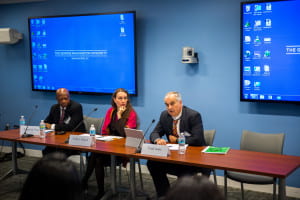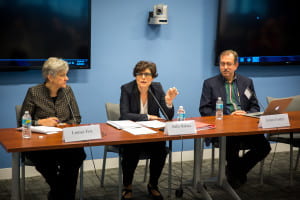Originally published on December 2, 2015
Sub-Saharan Africa faces challenges to achieving sustained growth, addressing inequality and gender disparity, and boosting its competitiveness in global trade. On Monday, November 9th, IIEP hosted a discussion of the recent IMF Regional Economic Outlook (REO) for sub-Saharan Africa in the Elliott School of International Affairs. The event featured professors from the George Washington University, as well as IMF Deputy Division Chiefs and Economists and external experts from the U.S. Census Bureau, the Growth Dialogue, and the University of Ghana.
Regional Economic Outlooks are used by the IMF to determine and predict future growth in particular areas of the world. According to this report, the economy of sub-Saharan Africa is set to register another year of solid growth. However, compared to recent years, the growth will be on the small side: this is mainly due to the sharp decline in oil prices and its impact on the region’s oil producers. Panelists from the various institutions discussed the chapters of the outlook in each session, delving into specific details and predictions.
In the event’s first session, “Dealing with the Gathering Clouds,” speakers discussed their research on why growth in Sub-Saharan Africa has weakened and what actions need to be taken in the near and middle-term in order to stimulate growth. External headwinds, domestic environment and outlook, and policy implications have underpinned performance in the last decade. Recently, however, commodity prices have weakened and financial conditions are tightening. External and fiscal positions are weaker than in 2008, and public debts have increased in frontier economies. In order to deal with the shifting situation, some countries have turned to their foreign exchange reserves and most have let their currency depreciate. As China becomes a bigger player in Africa, economists predict that a sharp global reallocation of financial assets could lead to rapid capital outflows from the region’s frontier markets. In the short-term, changes in fiscal and monetary policies need to have limited scope to counter the drag on growth. Medium-term considerations include policy actions that are geared toward boosting the region’s competitiveness and strengthening revenue mobilization to create fiscal space. The conclusion of this session? With the right policies, growth should strengthen again in the medium-term.
Celine Allard, the lead author of the IMF Africa report, Augustin Fosu (University of Ghana), and Frederick L. Joutz (IIEP-GWU) examined the implications of the Regional Economic Outlook for Sub-Saharan Africa. Allard noted that investments in infrastructure and education are critical to growth. She sees great potential in making the African agriculture sector more efficient and more productive as a means of creating wealth. She also discussed that Chinese investment in the region has the potential to create large growth, but could backfire if it is not properly managed. The panel highlighted the importance of using growth to increase future investment rather than current spending – and Frederick Joutz pointed to short term investment in higher education as insufficient investment. Augustin Fosu, however, encouraged sovereign investment and spending on long-term constructive infrastructure.

In session two, “Competitiveness in Sub-Saharan Africa: Marking Time or Moving Ahead?“, we were joined by Bhaswar Mukhopadhyay (Deputy Division Chief, African Department, IMF), Fariha Kamal (Center for Economic Studies, U.S. Bureau of the Census), and Danny Leipziger (IIEP-GWU and the Growth Dialogue). Our speakers examined recent developments in the region, the global economic outlook for sub-Saharan Africa, and policy recommendations to tackle the challenges that countries are facing in their attempts to grow weaker sectors to become stronger actors on the global stage. Kamal discussed that in order for market growth to begin in Sub-Suharan Africa, networks of exporters need to exist, which often make investment more attractive to foreign multinationals. Danny Leipziger narrowed in on competitiveness, arguing that while Africa is experiencing urbanization, there is a coinciding quick move to the services sector. This is a trend characteristic of rapid urbanization which leads to less productivity and long-term growth.
Session three, titled “Inequality and Economic Outcomes in sub-Saharan Africa,” featured Dalia Hakura (Deputy Division Chief, IMF), Louise Fox of UC-Berkeley, and IIEP’s own James Foster. Hakura found that Sub-Saharan Africa’s income and gender inequality remain among the highest worldwide. Inequality limits the allocation of resources and creates political instability. In middle-income African countries, the IMF foresees a growth dividend for states that invest in policies that reduce inequality. Benefits could include gains in per capita income and general economic growth. Governments should encourage a move to employment in the formal sector for women and the poor to encourage greater equality and ultimately, economic growth. Foster posed the question: is the relationship between policy and inequality really causal? Inequality creates an environment that does not encourage growth. Foster highlighted the limits of only focusing on “growth” in sub-Saharan Africa, suggesting that more multidimensional measures of well-being should be calculated. It is important to look specifically at the bottom 40% of citizens and examine not just shared prosperity, but the well-being and growth in this group, he said. What can their lifestyles tell us about the region?
In this final panel, our speakers highlighted the problems with presenting policy prescriptions without clearly identifying causal effects, discussing challenges to equality and measurement ideas. Carmel Chiswick, IIEP affiliate and moderator, proposed women’s education as the starting point for economic growth. The panel agrees that this is crucial, but must be paired with increasing economic opportunities to be effective in reducing inequality. Louise Fox (UC-Berkeley Visiting Professor of Development Practice and formerly of the World Bank) presented a more microeconomic approach, suggesting that to end inequality and violence against women, there needs to be changes on the cultural and normative level. Our panel members agreed that steps need to be taken to remove barriers that are in front of women, concluding that when gender inequality is addressed, there is great overall benefit for the region as a whole.

We would like to thank the IMF for co-sponsoring this event, and sharing their work with us and the community. These meetings help researchers learn about the IMF’s assessment of Africa, provide experts with a forum to offer constructive criticism of the IMF’s work, helps the IMF learn and grow, and allows us to open these discussions to students and future economists and the broader community interested in Africa. If you missed the IMF Africa Regional Economic Outlook, you can watch each session online!
